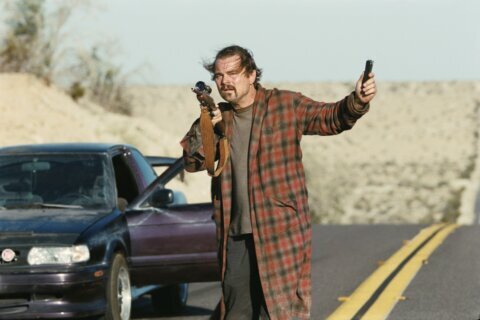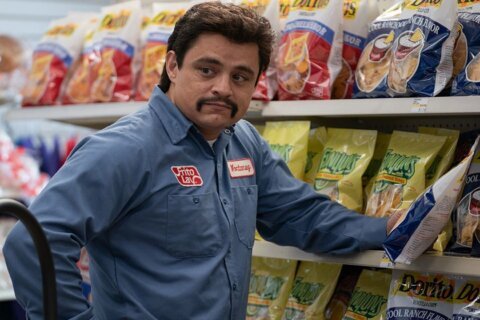WASHINGTON – Three years ago, David O. Russell directed Christian Bale to an Oscar with Amy Adams in “The Fighter.”
Last year, he directed Jennifer Lawrence to an Oscar across Bradley Cooper in “Silver Linings Playbook.”
Today, he combines all four stars for his greatest achievement yet, “American Hustle,” a tragicomedy that is as deceptively chaotic as it is meticulously controlled, and an instant Oscar contender for Best Picture, Director, Screenplay, Actor, Actress, Supporting Actor, Supporting Actress and a whole host of art department awards.
As the Oscar jockeying begins, expect doubters to claim “Hustle” is more style than substance. Let ’em. These folks aren’t looking closely enough (see bulleted list of directing techniques below), trying to call the bluff of a director who’s in on the joke, targeting the “O” in David O. Russell by mistaking his David O. Selznick showmanship for a Roger O. Thornhill emptiness, which Cary Grant admitted meant nothing in “North By Northwest” (1959).
Loosely based on the ABSCAM scandal of the late ’70s and early ’80s, “American Hustle” isn’t about the facts of the actual events as much as it is a character piece about a pair of con artists in love. Irving Rosenfeld (Christian Bale) and Sydney Prosser (Amy Adams) are a regular Bonnie and Clyde, swindling half of New Jersey with everything from forged paintings to stolen dry-cleaner drop-offs under the phony company name London Associates.
Their scam can only last so long, and is ultimately discovered by undercover FBI agent Richie DiMaso (Bradley Cooper). When DiMaso falls head over heels for Adams, he offers a reduced sentence if they’ll help him take down the mayor of Camden, N.J., Carmine Polito (Jeremy Renner). The plan is to stage a fake corrupt plot to remake Atlantic City with a series of sweetheart deals and try to catch him on camera taking a briefcase full of cash.
To pull off the sting, they must convince Carmine that a Middle Eastern sheik has donated millions of dollars into a shady bank account for the project. Complicating matters is Bale’s trashy, alcoholic wife Rosalyn (Jennifer Lawrence), who threatens to blow the whole thing with her big drunken mouth, and mob boss Victor Tellegio (Robert De Niro), who will kill them all if he finds he’s been duped.
The film is worth its weight in Oscar gold simply to witness this brilliant ensemble cast in action. Amy Adams deserves to follow Bale and Lawrence as the next Russell-directed star to win the gold. She’s long overdue after nominations for “Junebug” (2005), “Doubt” (2008), “The Fighter” (2010) and “The Master” (2012), but will face stiff competition from Cate Blanchett in Woody Allen’s “Blue Jasmine” (2013), the best portrait of gradually losing one’s mind since “A Woman Under the Influence” (1974), and Emma Thompson, who brings “Mary Poppins” author P.L. Travers to life in “Saving Mr. Banks.” However, Blanchett already won for “The Aviator” (2004), and Thompson has won twice for “Howard’s End” (1982) and “Sense and Sensibility” (1995), so I’d love to see Adams finally get her due.
Hers is a dual role. Her British alter ego dons sexy dresses with plenty of cleavage to seduce and scam Bale’s patrons. Your eyes won’t leave her whenever she’s on the screen. But her performance is at its best when the facade melts away, leaving a vulnerable, scared woman too far from home. As she scraps her British accent to reveal her true American identity, I was reminded of the tragic female duality in Hitchcock’s “Vertigo” (1958). Kim Novak’s Madeline is Adams’ Edith Greensley, and Novak’s Judy from Salina, Kansas, is Adams’ Sydney Prosser from Albuquerque, New Mexico.
Still, her Oscar moment — the clip they’ll show Oscar night — comes with tears in her eyes and a face without makeup, as she destroys Bale in an argument by explaining her business decision to woo Cooper: “Maybe I like him. Maybe I like him a lot. From the feet up, right? Baby.” It’s an exit line to rival “Double Indemnity” (1944), where Barbara Stanwyck crushed Fred MacMurray in the grocery store aisle: “Straight down the line.”
Which brings us to Bale. If you wondered whether there would be life after “The Dark Knight Trilogy” (2005-2012), here is your resounding answer. Bale gained lots of weight for the part, looking quite disgusting with a bulging gut and bald head pathetically hidden with a home-made wig and massive comb over. Of the four main characters, his performance is the least flashy, and yet absolutely carries the entire film with a portrait of both lost love (Adams) and marital strife (Lawrence).
The latter of Bale’s problems comes from a reckless wife he calls “the Picasso of passive-aggressive karate.” Lawrence’s character believes what she’s saying each time she flips an argument around with “the power of intention,” deflecting the blame off her own foolish mistakes with an insane reverse psychology that warps her gaffs into teachable moments for her husband. That’s right, it’s time to watch Batman in a volatile relationship with Katniss, a bat tangling with a mockingjay.
After striking box office gold with “The Hunger Games: Catching Fire” (2013), Jennifer Lawrence could strike Oscar gold again, this time in a supporting role. When she first appears in that blonde wig, she looks too young to play an older housewife. Then, she proceeds to sell it, wowing us with her outlandish, trashy performance. It makes me wonder: if we knew last year how good she would be in “American Hustle,” would we have saved the Oscar for this year?
Still, the real revelation might be her “Silver Linings” co-star Bradley Cooper, who continues to grow after his first nomination last year. Here, he plays an ambitious man who flies too high on borrowed wings, risking his entire case with the hubris of chasing the biggest politicians for the biggest scandal splash. Cooper is a fast-talking, jehri-curled delight, answering his own questions before others can respond and shifting from laughter to stoneface during a hilarious celebration. His road to Supporting Actor must go through Barkhad Abdi (“Captain Phillips”) and Jared Leto (“Dallas Buyers Club”).
It’s the “Silver Linings” duo who provide the film with the irresistible humor that got it nominated in the Comedy/Musical category at the Golden Globes. The biggest running gag comes as Cooper repeatedly interrupts an ice fishing story by his boss (Louis C.K.).
Meanwhile, the funniest dialogue comes from Lawrence, who insists on calling microwaves “science ovens.” How quickly we forget the mundane appliance was a cutting-edge gadget in ’70s kitchens.
While “American Hustle” is damn funny, it excels most when it’s at its most tragic. In addition to his failed romantic relationships, Bale develops a sincere friendship with the very mayor he’s about to sink, a bromance of former serial killers: Bale in “American Psycho” (2000) and Renner in “Dahmer” (2002). How would you feel if you knew your best friendship was doomed to end in tragedy?
The more you watch the film, the more you realize Renner’s character is the key. He is the substance beneath the style. Carmine Polito could have been a cliched, slimy political scumbag, but instead, Russell makes him a fully fleshed, sympathetic character. As Bale says, “That’s the way the world works. No black and white. Extremely gray.” This gray world has a twisted moral code, articulated by Adams: “Everybody at the bottom crosses paths eventually in a pool of desperation.”
And in this pool of desperation, Bale identifies Renner as one of the good guys, just like Vito Corleone had the moral high ground to The Turk in “The Godfather” (1972), even though they were both killers. Sure, Renner is slightly corrupt, but his heart is in the right place, doing it all for the people of New Jersey. Bale even argues that Cooper’s crusade against Renner will ruin America, crushing voter morale after the quagmire of Vietnam and the scandal of Watergate.
This intersection of character guilt and overall theme is the true genius of Russell, who rewrote the script from Eric Singer’s original draft “American Bullsh*t,” which landed right next to “Argo” on the 2010 Hollywood Blacklist, the coveted annual list of the best unproduced screenplays.
We knew that Russell could write his face off, and that he’s great working with actors, allowing ample room for improvisation. But he truly outdoes himself here as a cinesthetic director. After a gritty approach to “The Fighter” (2010), he made a controversial decision to direct “Silver Linings Playbook” with a bipolar tone. After all, this was a film about bipolar disorder, so the first half was a dark drama, while the second half was a rosy romantic comedy.
As Bale’s Irving Rosenfeld says, “You can fool yourself for just so long, and then your next reinvention better have your damn feet on the ground.”
“American Hustle” does just that.
Not only does Russell compile a tableau of ’70s art direction, hair, makeup and wardrobe to rival P.T. Anderson’s “Boogie Nights” (1997), his camera finds the most mesmerizing synergy with a mid-20th century pop soundtrack since Martin Scorsese in “GoodFellas.” That’s right, David O. Russell has created the year’s best Scorsese-style flick, better than Scorsese’s own “The Wolf of Wall Street,” just as Richard Linklater created the year’s best Woody Allen-style flick in “Before Midnight,” better than Allen’s own “Blue Jasmine.” If you say, “That’s impossible,” like Cooper’s reaction to a counterfeit Rembrandt painting, allow me to echo Bale’s retort: “The guy who made this was so good that it’s real to everybody. Now who’s the master? The painter or the forger?”
The Scorsese comparisons are indeed accurate, but Russell proves himself a master cinematic painter in his own right. As Cooper praises Bale: “He has vision. It’s the details. That’s what makes this guy a genius.” And as Bale praises Adams: “I’d never met anyone, man or woman, who was so careful and precise about everything. Every stylistic detail.” The same can be said of Russell:
(SPOILERS: READ DIRECTING TECHNIQUES AFTER INITIAL VIEWING)
- Russell opens with throwback studio logos set to Duke Ellington’s “Jeep’s Blues.” When Bale later praises Ellington — “Who starts a song like that?!?” — it’s a quote that also applies to Russell. I mean, who starts a film like that?!?
- In the opening title cards, Russell informs us that “some of this actually happened.” While this disclaimer is intended to draw a chuckle from audiences, Russell is up to much more, layering the audio track with a radio broadcast which ironically claims, “All news, all the time,” a striking contrast to the disclaimer on screen. Right there, even before the film’s opening shot, Russell has admitted his own artifice. The con has brilliantly, intentionally, begun.
- Russell opens with Bale’s elaborate hairpiece application in an extended opening scene set to America’s “Horse With No Name.” He lingers so long as to make us uncomfortable, simultaneously making us aware of the passing time, so that when Cooper abruptly messes his hair, we feel Bale’s agony. It’s textbook setup and payoff, all done through pacing.
- Note also that this is one of the only times we’ll see Bale without his glasses. They become his symbolic “hustle” prop, just like Cooper’s hair curlers, Adams’ British accent and Lawrence’s perfume. The only times we see Bale without his glasses are with the two people he loves: Amy Adams and his son.
- We then get slow-motion opening credits to Steely Dan’s “Dirty Work,” as Bale, Adams and Cooper enter a pair of double doors. Not only are the actors symbolically positioned with Adams between the two men, the camera also tilts from their feet up (Russell is taking his own advice; building his project from the feet up). As they enter the hotel room, the lyrics are all perfectly timed, as Bale turns back to close the door, leaving Adams alone with Cooper to the lyrics, “So you find somebody who can do the job for free,” foreshadowing their affair. Russell then cuts to a medium close-up of Adams and Bale to the lyrics, “I’m a fool to do your dirty work,” foreshadowing Adams’ jail cell realization that she’s been doing Bale’s dirty work.
- As Bale describes his shady dealings in voiceover narration, Russell pushes in on a piece of forged artwork, as we hear the audio transition into the next scene, where the mustached party host says, “I’m the host of the party. Enjoy.” We immediately cut to the party host (Paul Herman), who later becomes forged himself by posing as De Niro’s lawyer, Alfonse Simone, in an elaborate attempt to fool Cooper. Yes, this is the same man who lets Adams into the party and sits across from Bale when he first spots Adams. We the audience don’t yet know his importance to the plot, but the omniscient eyes of fate (the director) are always watching.
- During Bale’s “love at first sight” introduction to Adams, Russell uses slow-motion push-ins set to Chicago’s “Does Anybody Really Know What Time It Is.” The song title, along with the slow-motion, allows time to stand still, just like De Niro spotting Sharon Stone in “Casino” (1995).
- As Adams and Bale fall in love, dancing to Jack Jones’ “I’ve Got Your Number,” Russell tilts up to an upside-down reflection in an overhead mirror. Not only do their mirror doubles represent their dual identities, the shot has literally turned their world upside-down. Russell is now quite literally shooting from the feet up, and baby, he’s got our number.
- When it comes time for the big Bale-Adams kiss, Russell shoots it inside a spinning clothes rack of stolen dry-cleaner drop-offs, set to a piano rendition of “Blue Moon.” The swirling scene recalls the spinning wedding shot of Liotta and Bracco in “GoodFellas” (1990) or the neon-green kiss between Stewart and Novak in “Vertigo” (1958), only now the camera isn’t circling; the props are circling the characters. When Bale later returns to this spinning rack, gun in hand, the circular motion provides a different emotional effect: a whirlpool of sorrow.
- Russell also employs a nifty strobe light effect as Cooper and Adams dance at the disco to Donna Summer’s “I Feel Love.” If you’re not thrown into an epileptic seizure, you’ll realize Russell is thumbing his nose at all those who hated his “Dirty Dancing” sequence in “Silver Linings Playbook” (myself included). Touche.
- When Cooper and Adams lustfully charge into the bathroom stall, Harold Melvin’s “Don’t Leave Me This Way” soars for their first kiss. But the real symbolism comes as Tom Jones’ “Delilah” hits with the lyrics, “As she deceived me, I watched and went out of my mind.” Not only does Adams scream, as if out of her mind, she has also just deceived Cooper, promising to “be real” from this point forward, yet continuing to use her phony British accent long after this scene.
- As we cut back to the restaurant, Renner and Bale drunkenly belt out “Delilah,” which includes the lyrics, “I felt the knife in my hand,” like the sheik’s fake gift. As the two ramp up their bromance and trust in one another, the song stops precisely as Renner sits down a glass.
- During the sheik’s first meeting with Renner on the tarmac, Russell uses Electric Light Orchestra’s “10538 Overture” (also in the trailer) as the lyrics sing, “Did you see your friend crying from his eyes today?” The tragedy of betrayal has officially been set in motion.
- The most memorable scene may be the arrival at Atlantic City set to Elton John’s “Goodbye Yellow Brick Road,” as Russell asks his characters, “When are you gonna come down? When are you going to learn?” It’s beautiful fatalistic filmmaking, with each lyric timed perfectly. “I should have stayed on the phone” plays over a shot of Lawrence, who just got invited to the event by eavesdropping on the telephone. “You know you can’t hold me forever” plays over a two-shot of Bale and Renner, foreshadowing their ill-fated friendship. “I didn’t sign up for you” plays as Lawrence takes an idiotic sniff of her nail finish and puts her hand on Bale’s back. Finally, in an orgasmic moment for cinephiles, Adams and Cooper emerge through the fog as the song reaches its wailing chorus: “So goodbye yellow brick road. Where the dogs of society howl. You can’t plant me in your penthouse. I’m going back to my plough.” It’s a call for Adams to ditch her phony existence and get back to the basics, which she does in the end.
- When it comes time for the sheik to perform his dog-and-pony show for DeNiro, we get an Arabic rendition of Jefferson Airplane’s “White Rabbit,” fitting for a phony sheik trying to pull a metaphorical rabbit out of his hat. Arabic subtitles increase the suspense, as the film’s own artifice nearly buckles beneath its own English language.
- As the Atlantic City event spirals out of control, and Lawrence gives a Judas-to-Jesus kiss of betrayal to Adams, Russell triggers The Bee Gees’ “How Can You Mend a Broken Heart,” for a string of brilliant visual storytelling: Lawrence crying on a man’s shoulder, DeNiro casting suspicious eyes on Bale and the sheik, and a Steadicam tracking shot of Renner taking a political stage, promising voters populist dreams that Bale knows tragically won’t come true.
- As we enter the homestretch, Russell uses another Steadicam tracking shot as a bodyguard leads Bale, Adams and Cooper through the hallways of Alfonse Simone’s phony lawyer’s office, set to Jeff Lynne’s “Long Black Road.” Cooper does not know he’s being played, and neither does the audience, but Russell is dropping hints for truly engaged viewers. Note the lyrics as Cooper stands in the elevator and removes his sunglasses: “You’ve got to get out to work and face reality.” Note also how the melody changes each time office doors are opened, triggering a falsetto voice as they enter the false lawyer’s office. Genius.
- Finally, in the film’s last shot, Russell returns to Duke Ellington’s “Jeep’s Blues” with diagetic sound on a record player, bringing the film full circle. The final shot shows Bale finally without his glasses, as he is now seeing clearly, staring at his one true love, Adams. As Ellington’s percussion slams onto the soundtrack, triggering the title card, “Directed by David O. Russell,” I sat with jaw dropped, echoing Bale’s admiration for Ellington: “Who ends a film like that?!?”
I mention all this simply to say that if you watched the film with superficial enjoyment, you got hustled. If you thought it was more style than substance, you also got hustled. And if you found parts boring, you’ve been hustled by decades of blockbusters that have diluted our collective ability to actively engage with cinematic audio and visuals. Just because a shot is slow, doesn’t mean you tune out. This is precisely when you should tune in. I beg all of you to watch the film again, for great cinema deserves repeat viewings. As Bale says, “The art of survival is a story that never ends.”
What a rare treat, then, that this art masterwork is also so much damn fun the first go-round. Even when Russell overreaches, like Lawrence belting Paul McCartney’s “Live and Let Die” while scrubbing the kitchen counter, it’s an intoxicating experience. Like Lawrence’s unique nail finish of flowers and garbage, Russell’s slight scent of trash is what keeps us coming back. We’ll allow just a hint of the campy “hustle” if it means getting to watch the rest of the creative juices “flow.”
I guess you could say, we as fans of the movie, or we as critics hailing the film, are just like Bale says, “We talk ourselves into things. We sell ourselves things we don’t even need or want. We’re dressin’ ’em up. We leave out the risk. We leave out the ugly truth. Pay attention to that, ’cause we’re all conning ourselves in one way or another, just to get through life.” “Hustle” not only articulates this, it follows its own advice, making sure to include the ugly truth, as various characters suffer the loss of love, jobs, reputation, identity, family and friendship. I’ll sell myself on “American Hustle” any day.
If the Academy sells itself on “Hustle,” the film could have a very big night. Russell has been nominated twice for Best Director, so if this one finally gets him the win, I won’t be disappointed. However, it’s much more likely the year of Steve McQueen or Alfonso Cuaron, who respectively reshaped the concept of long single-takes in “12 Years a Slave” (watching a man hang in a noose) and “Gravity” (with space shuttles floating in mind-blowing camera choreography).
While those two films have the edge in the directing category, “American Hustle” should win Best Original Screenplay. It could also win Best Picture, if Academy voters deem “12 Years a Slave” too depressing, or if “Gravity” doesn’t translate as well on DVD screeners as it did in 3D IMAX. This could allow “Hustle” to sneak in as this year’s “Argo,” another real-life ’70s tale of a Middle Eastern ruse, complete with a throwback studio logo, powerful soundtrack, biting humor amid the chaos, and a script originally slated to be directed by Ben Affleck. With all due respect to McQueen, I have a feeling this will be a year more like 1973 than 1993; more like “The Sting” than “Schindler’s List.”
Perhaps the biggest treat of “American Hustle” is knowing that young fans who have grown up on Batman and Katniss will be exposed to a power directing display, which requires throwback patience in the beginning, and cutting-edge flair down the stretch. In a way, Russell is conning youngsters to appreciate quality cinema, just as he’s daring Academy voters not to smile.
“We’ve gotta get over on all these guys,” Adams says.
“It’s gotta be the best we’ve ever done,” Bale replies.
It is.
★ ★ ★ ★
The above rating is based on a 4-star scale. Follow WTOP Film Critic Jason Fraley on Twitter @JFrayWTOP, read his blog The Film Spectrum or listen Friday mornings on 103.5 FM.
Follow @WTOP on Twitter.








